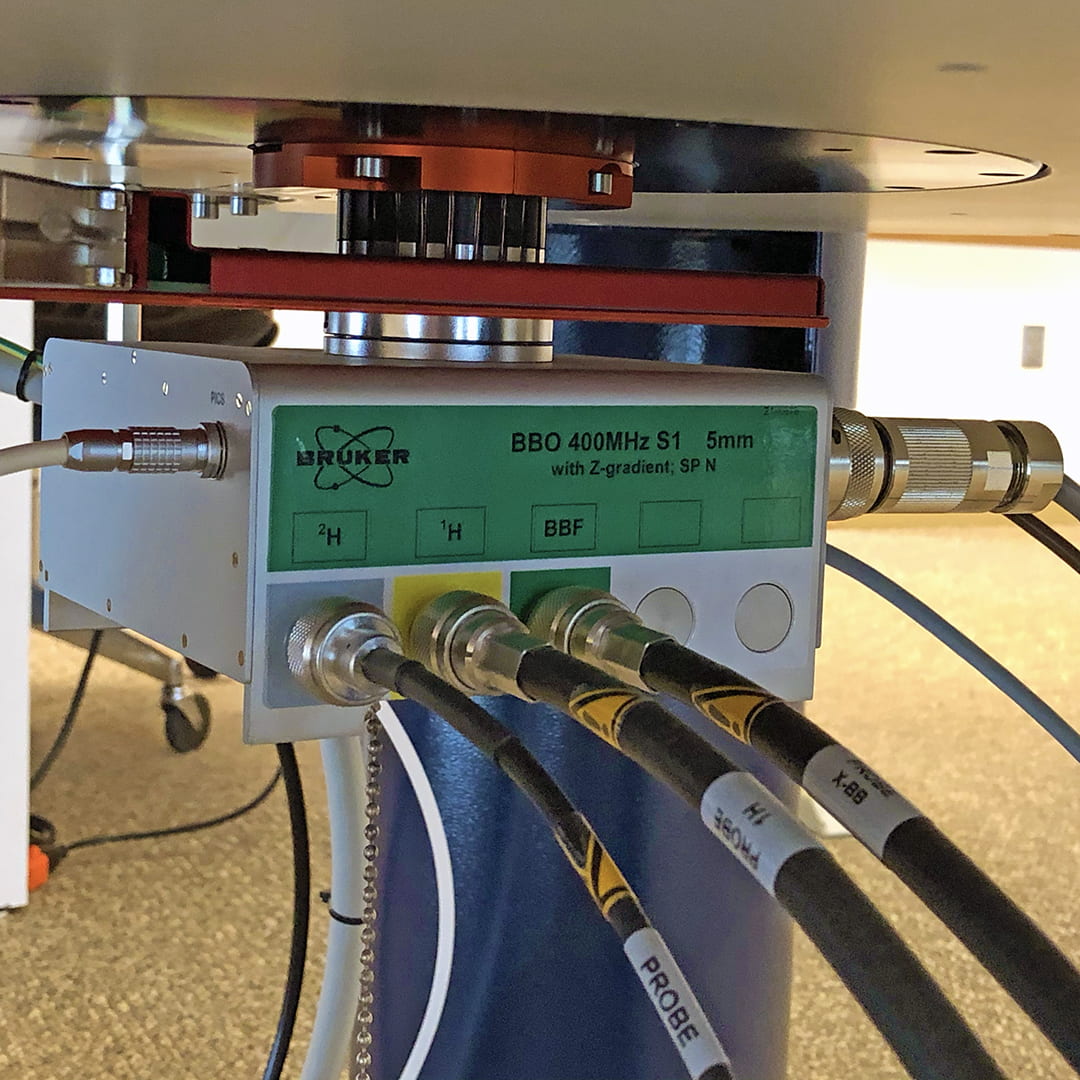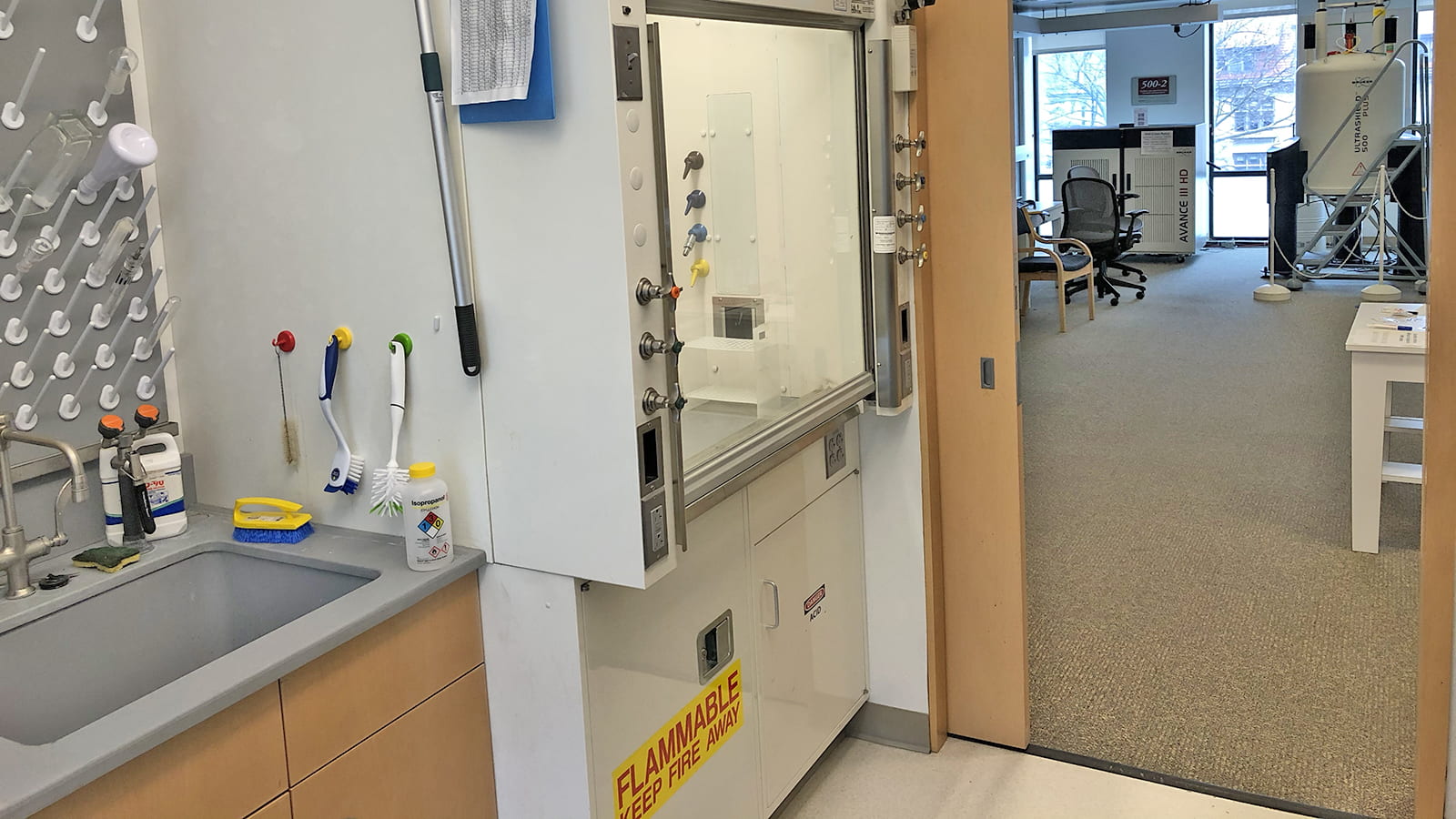Searle Lab Instruments & Support Lab
Primarily serving researchers located on the east side of Ellis Ave., the third floor NMR Laboratory is room 340B of the Searle Chemistry Laboratory, which was renovated in 2009 and is LEED Gold certified. To enter the NMR lab, one transits through the Mass Spectrometry facility, room 340A. It houses four NMR spectrometers, the Facility Manager’s office, and a small support lab (with a hood, bench, and sink, it is perfect for conducting reactions and titrations to be monitored by NMR).
Note: access to the third floor is restricted by swipecard configuration at all elevators and doors, and access to the analytical facility, including the NMR lab, requires an additional permission. Visitors should please contact the facility manager in advance by email to arrange for entry.
Overview of Searle Instruments
| Spectrometer | Primary Use | Magnet | Console | Probes |
| 600-1 | Manual operation, intensive VT: -40 °C to +150 °C 1D, 2D, multinuclear; kinetics, titrations,… |
Ascend 14.1 T (2023) |
Avance Neo 600 MHz (2023) |
Prodigy BBO, low-fluorine (default) TBO X{1H,19F}, low-fluorine |
| 500-2 | Manual operation, intensive VT: 25 °C to +150 °C 1D, 2D, multinuclear; kinetics, titrations,… |
UltrashieldPlus 11.7 T (2009) |
Avance III HD 500 MHz (2014) |
Prodigy BBO, low-fluorine (default) |
| 500-1 | Walkup spectroscopy, ≤ 20 min/session 25 °C only 1D, 2D, multinuclear |
UltrashieldPlus 11.7 T (2009) |
Avance III 500 MHz (2012) |
SmartProbe BBO (default) |
| 400-1 | Fully Automatic, 25 °C only 1D, 2D, Multinuclear |
Ascend 9.4 T (2016) |
Avance III HD 400 MHz Nanobay (2016) |
SmartProbe BBO (default) |
600-1
The 600 is our newest and most sensitive instrument. Equipped with an extra-sensitive cryogenic Prodigy probe with BBO (broadband observe) configuration, it is perfect for full characterization of synthetic final products in low concentration, using a wide variety of 1D and 2D methods, and over a dozen observable nuclei. Highly flexible and located close to our supporting wet lab, is it often used for titrations and kinetics at temperatures between -40 °C and +150 °C. It is also equipped with a simple LED optical device that illuminates samples while they are in the magnet, enabling exploration of photochemistry by NMR.
Purchase of the 600 MHz cryogenic probe was generously supported by the Trivedi Foundation, to which we are grateful. This probe is important for Prof. Jack Szostak’s investigations into the Origins of Life, and benefits many other UChicago researchers as well.

Console
• Bruker Avance Neo 600 MHz
• 3-channel (supports H-F-X experiments)
• Z-gradients
• BCU-II for cooling samples to -40 °C
• SampleCase autosampler (24)
• User-made optical excitation apparatus
• Installed in Searle 2023

Default Probe
- Bruker Prodigy BBO cryogenic probe, low-fluorine; -40 to +150 °C
- Inner coil (more sensitive) = broadband (31P-77Se/10B-35Cl)
no 19F or 199Hg-17O - Outer coil = (1H or 19F), and 2H
- Z-gradient
- automated tuning
Optional Probe
- Bruker TBO (BBF/1H/19F, low-fluorine) triple resonance with Z-gradient; -150 to +150 °C

Magnet
- Bruker Ascend 14.1 T / 600 MHz
- 5-gauss line within the magnet legs
- Liquid helium hold time 150 days
- Manufactured 2022; installed 2023

Auto-sampler
- Bruker SampleCase 24
- Accessible “ADA height”
- Safe operations outside 5G
- Easy bypass when needed

400-1
Fully automated with a 60-sample autosampler, 400-1 provides the most convenient way to obtain routine NMR spectra in Searle. Equipped with a Bruker “Smart” BBFO probe with automated tuning, this instrument acquires high-quality spectra with a wide variety of experiments, including 2D (COSY, HSQC, HMBC), and heteronuclear 1D (13C, 31P, 19F, 11B, and more) – each sample requiring only a minute or two to set up. Researchers with special privileges are allowed to run “intermittent” kinetics experiments, in which short spectra of a sample containing an ongoing reaction are acquired on a near-regular schedule for several hours or days.
Researchers use 400-1 in three popular ways:
• Running several samples (~2-6) at once, supporting research in synthetic methodology
• Conveniently acquiring multiple characterization spectra at night, e.g. 1H, COSY, HSQC, HMBC, long 13C
• Providing focus on data analysis, not mechanics of acquisition – perfect for infrequent users

Console
• Bruker Avance III HD 400 MHz Nanobay
• 2-channel, Z-gradient
• Manufactured 2016, installed 2017

Default Probe
- Bruker BBFO “Smart” probe
- Inner coil (more sensitive) = 19F-109Ag
- Outer coil = 1H, 2H
- Z-gradient
- automated tuning
- Manufactured 2016; installed 2017

Magnet
- Bruker Ascend 9.4 T / 400 MHz
- 5-gauss line within the magnet legs
- Liquid helium hold time 300 days
- Manufactured 2016; installed 2017

Auto-
sampler
• Bruker SampleCasePlus (60)
• Manufactured and installed 2020
• Handles all NMR tubes less than 222 mm (8.75″) long (including valved tubes, e.g. WILMAD 528-LPV-200M and NEW ERA NE-CAV5-135).

500-2
This is the instrument preferred for intensive experiments such as variable temperature (VT), titrations, reaction monitoring, customized 2D, etc. Reservations are required for overnight blocks or sessions up to 5 hours. When not in use or reserved, it is available for unreserved walkup use (< 20 min).
500-2 is the only spectrometer in Searle available for VT experiments, which require a short training session to perform. Researchers must schedule VT training with the facility manager before reserving time for VT experiments.

Console
• Bruker Avance III HD 500 MHz
• 3-channel, XYZ-gradients
• Installed in Searle 2014

Default Probe
- Bruker Prodigy BBO cryogenic probe, low-fluorine; -40 to +150 °C
- Inner coil (more sensitive) = broadband (31P-77Se/10B-35Cl)
no 19F or 199Hg-17O - Outer coil = (1H or 19F), and 2H
- Z-gradient
- automated tuning

Magnet
• Bruker Ultrashield Plus 11.7 T / 500 MHz
• Liquid helium hold time 150 days (extra-long)
• Manufactured 2006
• Installed in current location 2023

Auto-sampler
Bruker SampleCasePlus (60)
• Manufactured 2022, installed 2023
• Handles all NMR tubes less than 222 mm (8.75″) long (including valved tubes, e.g. WILMAD 528-LPV-200M and NEW ERA NE-CAV5-135).

500-1
This is the preferred instrument for synthetic chemists in Searle who need rapid access to a manually-operated spectrometer so they can quickly assess reaction outcomes and make immediate decisions about their project’s next steps. Each session is limited to 20 minutes, and reservation are not required. Default parameter sets for essential 1D and 2D experiments are provided with that time limit in mind, ensuring maximum productivity.

Console
• Bruker Avance III 500 MHz
• 4-channel (including 2H)
• XYZ-gradients
• Installed in Searle 2012

Default Probe
- Bruker BBO “Smart” probe
- Inner coil (more sensitive) = broadband 19F-109Ag
- Outer coil = 1H, 2H
- Z-gradient
- automated tuning
Magnet
• Bruker Ultrashield Plus 11.7 T / 500 MHz
• Liquid helium hold time 150 days (extra-long)
• Manufactured 2006; installed in Searle 2009

Auto-sampler
• Bruker SampleCase 24-sample autosampler
• Manufactured 2016; installed on 500-1 2023

Support Lab
The Searle NMR facility includes a small support lab equipped with a fume hood, bench, sink, flammables cabinet, and solvents cabinet. It’s perfect for conducting titrations or starting reactions to be monitored by NMR. Mixing chemicals and preparing samples is not allowed on the magnet floor, so having this resource here means researchers do not need to exit the facility and return to their own labs every time a sample needs a chemical adjustment.
Policy
The support lab operates on a “pack-it-in-pack-it-out” policy. The facility supplies no consumables and handles no waste. Researchers must bring their own materials (pipettes, gloves, safety glasses, small waste containers, etc.), usually in a plastic tray, and must leave the room as they found it, taking their hazardous waste with them.

